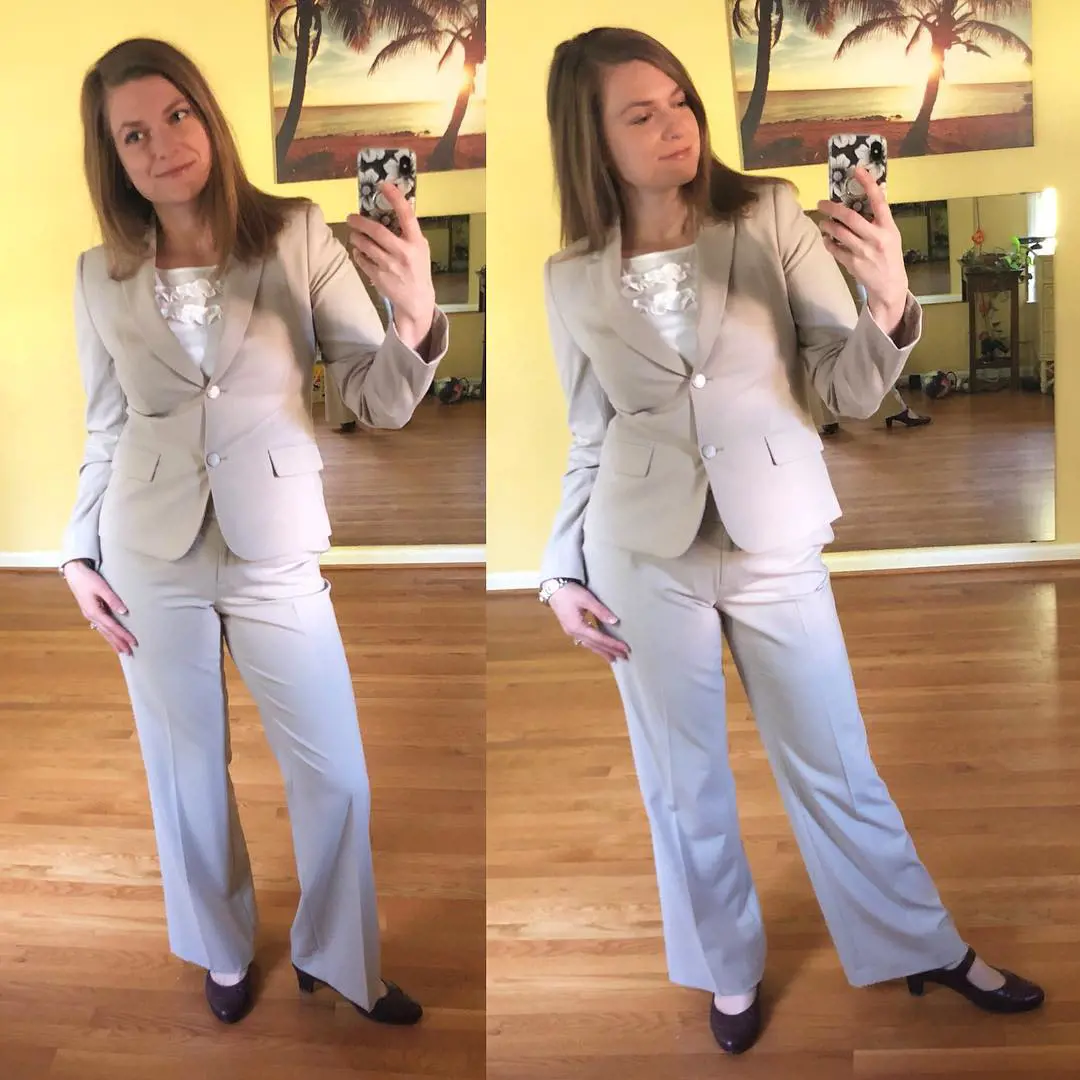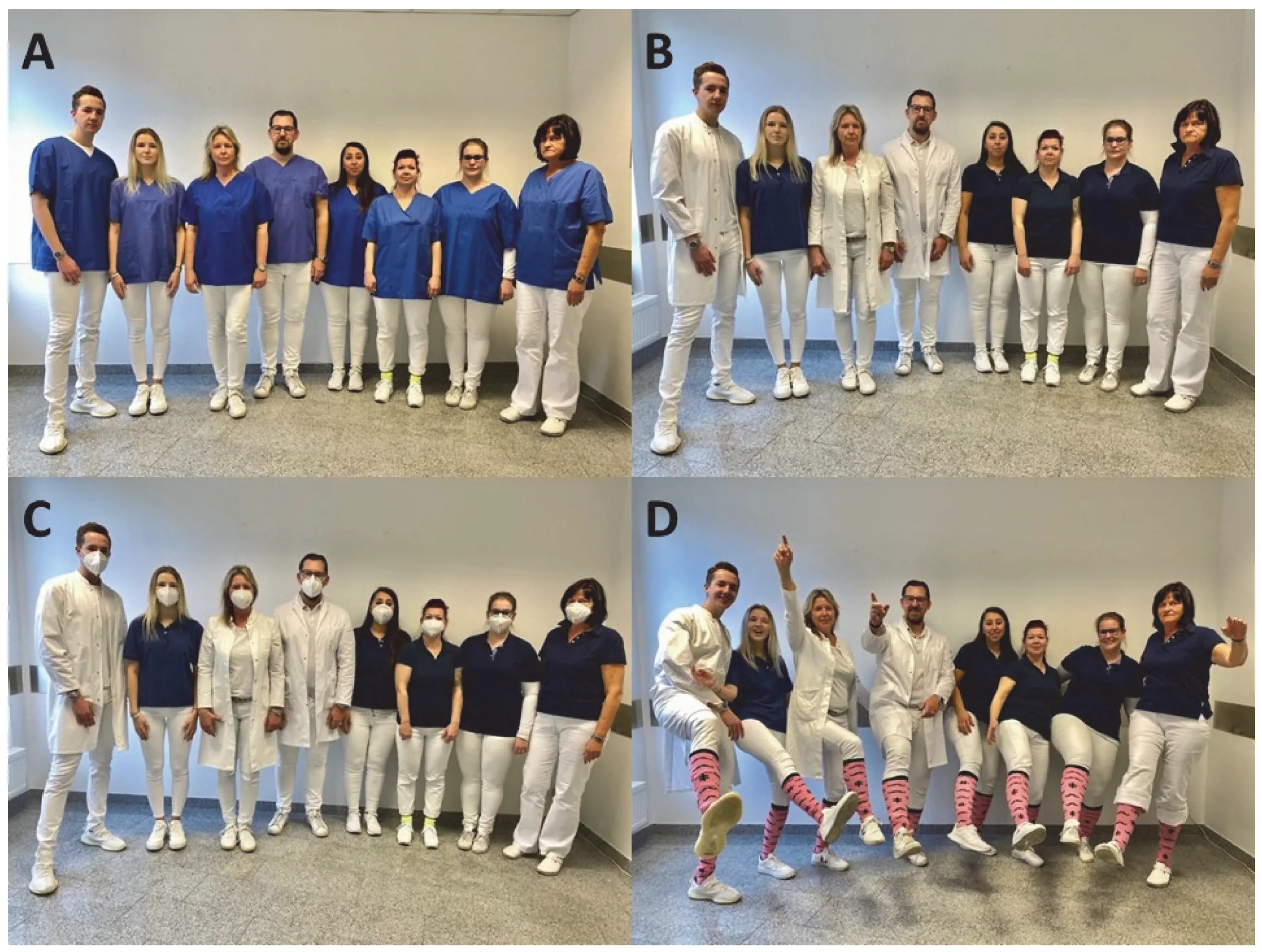
In the mysterious and intricate world of biology, where scientists explore the intricacies of life itself, one might wonder if there is a strict dress code to match the complexity and sophistication of the field. With lab coats, safety goggles, and gloves often donned as a customary attire, it seems that biology careers have a dress code that goes beyond personal style. However, just as the diversity of life forms on this planet, so is the range of fashion choices among biologists. From casual fieldwork attire to professional formalwear, the world of biology offers a fascinating glimpse into how personal style and scientific exploration can coexist.
| Characteristics | Values |
|---|---|
| Gender | No |
| Hairstyle | No restrictions |
| Clothing | Casual/Professional |
| Jewelry/Piercings | Limited |
| Tattoos | Allowed |
| Uniform | Sometimes |
| Make-up | Optional |
| Shoes | Comfortable |
| Personal Hygiene | Important |
| Body Odor | Not acceptable |
| Safety Gear | Required |
| Lab Coat | Required |
| Protective Eyewear | Required |
| Gloves | Required |
| Hairnets/Face masks | Required |
| Closed-toe Shoes | Required |
| Cleanliness of Workplace | Important |
| Dress Code Policy | Established |
| Adherence to Policy | Expected |
What You'll Learn
- Do biology careers typically have a dress code?
- What kind of attire is commonly expected in biology careers?
- Are there any specific restrictions or guidelines for clothing in biology careers?
- How important is dressing professionally in the field of biology?
- Do different types of biology careers have different dress code expectations?

Do biology careers typically have a dress code?

When it comes to careers in biology, many people wonder if there is a specific dress code that they will have to adhere to. The answer to this question can vary depending on the specific job and workplace, but in general, biology careers do have some dress code requirements.
In research labs and scientific facilities, it is important to maintain a clean and sterile environment. This means that employees are typically required to wear lab coats, gloves, and other protective clothing. These items help prevent contamination and keep the experiments or research materials safe. In addition to lab coats, closed-toe shoes are often mandatory to reduce the risk of accidents and chemical spills.
However, in certain biology careers, such as those in the field or in an office setting, the dress code might be more relaxed. Field biologists, for example, often spend a lot of time outdoors collecting samples or observing wildlife. In these cases, comfortable and practical clothing that can withstand outdoor conditions is often more suitable. This could include hiking boots, breathable clothing, and appropriate weather gear.
In an office setting, the dress code might be similar to that of any other professional setting. Business casual attire, such as slacks, skirts, blouses, and dress shoes, is often the norm. However, some offices might have specific requirements, such as the need to wear a lab coat or other protective gear when working with certain samples or equipment.
While there are general guidelines for dress code in biology careers, it is important to remember that each workplace might have its own specific requirements. It is always a good idea to check with your employer or supervisor to ensure that you are following the appropriate dress code for your specific job.
Overall, the dress code in biology careers can range from strict requirements in research labs to more relaxed attire in the field or office settings. Regardless of the specific requirements, it is important to prioritize safety, professionalism, and practicality when choosing your clothing for work.
Discover the All-Day Comfort of Skechers Dress Shoes for Walking
You may want to see also

What kind of attire is commonly expected in biology careers?

When it comes to attire in biology careers, there are a few general expectations that are commonly followed. While the specific dress code can vary depending on the workplace and job requirements, there are some common guidelines that can help individuals dress appropriately for a career in biology.
- Professionalism: In many biology careers, professionalism is key. This means that attire should be neat, clean, and well-maintained. A professional appearance demonstrates respect for the job, colleagues, and clients. It also helps to create a positive image for the field of biology as a whole.
- Safety: In some biology careers, safety is of utmost importance. This may include wearing specific safety gear such as lab coats, gloves, safety goggles, or even full protective suits. These items are designed to protect individuals from potential hazards in the workplace, such as chemicals, biological agents, or physical injuries.
- Comfort and functionality: In a field where individuals may be spending long hours in a lab or in the field, it's important to prioritize comfort and functionality in attire. This may mean wearing clothing that allows for freedom of movement, breathability, and durability. Many individuals opt for clothing made from materials such as cotton or synthetic blends that can withstand the demands of the job.
- Dress code: Depending on the workplace, there may be a specific dress code that individuals are expected to follow. This could include requirements such as wearing business attire, casual attire, or even uniforms. It's important to be aware of and adhere to any dress code policies that are in place.
- Adaptability: In biology careers, individuals may need to adapt their attire based on the specific tasks or environments they are working in. For example, if individuals are conducting fieldwork in a tropical rainforest, they may need to wear lightweight, moisture-wicking clothing to stay comfortable in the humid conditions. On the other hand, if individuals are working in a controlled lab setting, they may need to wear more formal attire such as lab coats or suits.
It's important to note that the specific attire requirements can vary greatly depending on the type of biology career. For example, individuals working in a research laboratory may have different dress expectations than those working in a wildlife conservation setting. It's always a good idea to research and inquire about the specific dress code or expectations of a particular job or workplace.
Overall, attire in biology careers should be professional, safe, comfortable, and adaptable to the specific demands of the job. By following these guidelines, individuals can ensure they are dressing appropriately and professionally for their chosen field of biology.
The Mystery Behind Dress Shoes with Tiny Holes
You may want to see also

Are there any specific restrictions or guidelines for clothing in biology careers?

When it comes to careers in biology, there are generally no specific restrictions or guidelines for clothing. However, there are some recommendations and considerations that can help ensure comfort, safety, and professionalism in the field.
Comfort is a crucial aspect to consider when choosing clothing for a biology career. Many biologists spend long hours in the field or in research laboratories, which can be physically demanding. It is important to wear clothing that allows for ease of movement and is made from breathable materials that won't trap sweat or cause discomfort. Opting for loose-fitting, moisture-wicking fabrics can help prevent overheating and keep the biologist comfortable throughout the day.
Safety is another important consideration when it comes to clothing in biology careers. Depending on the specific field of study or role, biologists may be exposed to various hazards such as chemicals, biological agents, or physical dangers. In such cases, it is necessary to prioritize safety by wearing appropriate protective clothing. This may include lab coats, gloves, goggles, or even specialized attire such as coveralls or biohazard suits. Following safety protocols and wearing the appropriate gear helps minimize the risk of injury or exposure to harmful substances.
In addition to comfort and safety, professionalism is also a key factor to consider when it comes to clothing in biology careers. While there may not be specific dress codes in place, it is important to present oneself in a professional manner. This may involve wearing clean and neat clothing that is suitable for the setting, whether it is a research laboratory, a field site, or an office. Avoiding overly casual or revealing attire is generally a good rule of thumb, as it helps maintain a level of professionalism and respect for the work being conducted.
Examples of appropriate clothing choices for biology careers include khakis or slacks paired with a button-down shirt, a blouse, or a lab coat. Closed-toe shoes are often recommended for safety reasons, as they provide protection from potential hazards on the ground or in the laboratory. Wearing comfortable shoes that are appropriate for the terrain or environment is also important for fieldwork.
Overall, while there may not be strict restrictions or guidelines for clothing in biology careers, it is important to consider comfort, safety, and professionalism when choosing attire. By prioritizing these factors, biologists can ensure that they are well-equipped for their work and can focus on making meaningful contributions to the field.
The Ultimate Guide to Shopping for a Dress Belt Size XXXL
You may want to see also

How important is dressing professionally in the field of biology?

In the field of biology, professionalism is highly valued and affects various aspects of one's career. One key aspect of professionalism is dressing appropriately for different work settings. While many may view it as a superficial matter, the importance of dressing professionally in biology cannot be understated.
Firstly, dressing professionally helps create a positive and credible image. As a biologist, one often interacts with colleagues, supervisors, and potential collaborators. The way one dresses can convey a sense of professionalism and competency. It signifies that an individual takes their work seriously and demonstrates respect for the field. When presenting research findings or participating in conferences, a well-dressed biologist will be taken more seriously and be more likely to leave a lasting impression.
Moreover, in certain work settings such as laboratories or field research, dressing professionally is essential for safety reasons. Laboratories often have strict regulations regarding the type of clothing allowed, such as closed-toe shoes and lab coats. Failure to adhere to these rules can lead to accidents or contamination of experiments, jeopardizing the integrity of the research. In fieldwork situations, appropriate clothing, such as long pants and sturdy shoes, protects biologists from potential hazards, such as sharp objects or poisonous plants.
Furthermore, dressing professionally fosters a sense of belonging and unity within the scientific community. The field of biology encompasses various disciplines and sub-disciplines, and each has its own unique dress code. By adhering to the accepted norms of dress, biologists show respect for the traditions and values of their field. Additionally, professional attire can help biologists feel more confident and empowered. When surrounded by colleagues who are dressed professionally, individuals are more likely to be motivated and inspired to perform at their best.
To ensure professionalism in dress, biologists should follow a few key steps. Firstly, they should familiarize themselves with the specific dress code in their workplace or research setting. This information can typically be found in employee handbooks or by consulting with supervisors or colleagues. Secondly, they should invest in appropriate clothing and accessories that align with the dress code. This may include lab coats, safety goggles, or specialized field gear. Lastly, biologists should prioritize personal hygiene and grooming to present a polished and professional appearance.
Nonetheless, it is essential to acknowledge that biological research encompasses a wide range of sub-disciplines, each with its own unique requirements. In some areas, such as marine biology or field ecology, the dress code may be more relaxed to accommodate the practicality and physical demands of the work. In these cases, functionality and safety take precedence over formal attire. However, even in such cases, professionals should still strive to present themselves in a neat and presentable manner, as first impressions are crucial in any field.
In conclusion, dressing professionally is of great importance in the field of biology. It contributes to a positive image, ensures safety, fosters unity within the scientific community, and enhances confidence and motivation. By following the specific dress codes of their respective workplaces and investing in appropriate clothing and accessories, biologists can project professionalism and succeed in their chosen careers. Regardless of the specific sub-discipline, presenting oneself in a polished and respectable manner is crucial for making a lasting impact in the field of biology.
Is Sizing Up in Dresses the Key to Comfort and Style?
You may want to see also

Do different types of biology careers have different dress code expectations?

When it comes to biology careers, there are a wide range of options available. From working in a laboratory to conducting field research, each type of biology career may have different dress code expectations. In this article, we will explore the various types of biology careers and discuss the dress code expectations that come with each.
Laboratory Researchers:
Laboratory researchers are often engaged in conducting experiments and analyzing data. In most cases, laboratory researchers are expected to wear appropriate attire such as lab coats, safety goggles, and closed-toe shoes. These safety measures are essential to protect the researchers from potential hazards in the lab environment.
Field Biologists:
Field biologists spend most of their time conducting research in outdoor settings. Depending on the nature of their work, field biologists may need to dress in a way that allows them to move comfortably in rugged terrains. This may include wearing sturdy hiking boots, durable clothing, and protective gear such as hats, sunscreen, and insect repellent. Field biologists must also consider weather conditions and dress accordingly to stay safe and comfortable during their research activities.
Conservationists:
Conservationists work towards preserving and protecting ecosystems and wildlife. Their dress code expectations may vary depending on their role and the location of their work. In some cases, conservationists may be required to wear specialized gear such as rangers in national parks or wildlife sanctuaries. This may include uniforms and protective equipment such as hats, boots, and even firearms in some cases.
Academics/Teachers:
Biology academics or teachers who work in educational institutions may have different dress code expectations compared to those working in research or fieldwork settings. They are often expected to dress professionally and adhere to the institution's dress code policy. This may include wearing formal attire such as suits, dresses, or business casual attire. The expectation is to present themselves as professionals and serve as role models to their students.
Medical Professionals:
Biologists working in the medical field, such as doctors or nurses, have their own dress code expectations. They are typically required to wear scrubs or lab coats, along with appropriate protective gear such as gloves and masks. This is to maintain a sterile environment and prevent the spread of infections.
In conclusion, different biology careers have varying dress code expectations based on the nature of the work and the environment in which it is conducted. Laboratory researchers may need to wear protective clothing, field biologists must dress for outdoor conditions, conservationists may require specialized gear, academics/teachers must adhere to professional dress codes, and medical professionals must wear appropriate attire to maintain a sterile environment. It is important for individuals pursuing biology careers to be aware of and adhere to these dress code expectations to ensure their safety and professionalism in their respective fields.
The Satisfying Wait: How Long Does Rose Dress Take to Ship?
You may want to see also
Frequently asked questions
Yes, there is typically a dress code for professionals in biology careers. While the specifics may vary depending on the workplace, the overall expectation is usually to dress in a professional and appropriate manner. This often means wearing business casual attire, such as slacks or a skirt with a blouse or dress shirt. However, in certain laboratory or field work settings, there may be additional safety considerations that require the use of specialized clothing or personal protective equipment.
Lab coats and other protective clothing are often required for professionals working in biology careers, particularly in laboratory settings. These garments help to protect individuals from chemical spills, biological hazards, and other risks. Additionally, they help to prevent contamination of samples or experiments. In some cases, specialized personal protective equipment may also be necessary, such as gloves, face shields, or respirators, depending on the specific nature of the work being done.
While there may not be specific restrictions on colors or patterns for clothing in biology careers, it is generally advisable to avoid wearing bright or distracting colors, as well as clothing with busy or overly bold patterns. This is because these types of clothing can be distracting or disruptive in laboratory or research settings. It is best to opt for more neutral and subdued colors and patterns that are appropriate for a professional environment.
In general, it is best to avoid wearing casual clothing in a biology career, especially in more formal or professional settings. While the specific dress code may vary depending on the workplace, it is typically expected to dress in a more professional and appropriate manner. Casual clothing, such as t-shirts, jeans, and sneakers, may not be suitable for the work environment. It is always important to consult the specific dress code guidelines of your workplace to ensure that you are complying with their expectations.







